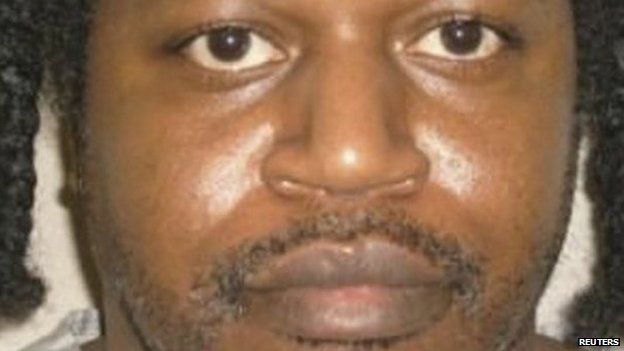Delayed Charles Warner execution goes ahead in Oklahoma
- Published

The US state of Oklahoma has executed the first death row inmate since a botched lethal injection last year drew intense criticism.
Prison officials said that Charles Warner was injected with a mixture of drugs and did not suffer before dying.
Death row inmates and campaigners have complained that the use of drugs in executions presents an unconstitutional risk of pain and suffering.
Warner was convicted for the rape and murder of an 11-month-old girl in 1997.
He was supposed to be executed on the same night as another high profile murderer, Clayton Lockett, in April 2014.
But it was postponed because the lethal injection of three drugs in Lockett's case failed to work properly.
His execution was stopped after 20 minutes when one of his veins ruptured, preventing the drugs from taking full effect. He writhed and shook uncontrollably after the drugs were administered, witnesses said.
Lockett's execution was one of three that went wrong last year using the midazolam drug, the Washington Post reported, focusing attention on the few states within the US that still conduct capital punishment.
'On fire'
Another murderer, Johnny Shane Kormondy, was executed 12 minutes after Warner in the state of Florida - also with the same three-drug combination.
"Before I give my final statement, I'll tell you they poked me five times. It hurt. It feels like acid," Warner said before his execution started. "I'm not a monster. I didn't do everything they said I did.''
Correspondents say that although Warner complained that his body was "on fire", he showed no obvious signs of distress.
However his lawyer, Madeline Cohen, said there was no way knowing if Warner suffered because the second drug, a paralytic, would have prevented him from moving.
Both Warner and Lockett had unsuccessfully challenged a state law that shields the identities of companies supplying the drugs.
The problems surrounding Lockett's execution in particular were the centre of a wider debate over the legality of the three-drug method and whether its use violates guarantees in the US constitution "against cruel and unusual punishment".
Both men unsuccessfully challenged an Oklahoma state law that blocks officials from revealing - even in court - the identities of the companies supplying the drugs.
The state maintains the law is necessary to protect the suppliers from legal action and harassment.
Lockett and Warner argued they needed to know the names of the suppliers in order to ensure the quality of the drugs that would be used to kill them and to be certain that they had been obtained legally.
Warner's execution went ahead after five out of nine justices in the US Supreme Court voted in favour.
- Published2 October 2014
- Published30 April 2014
- Published22 April 2014
- Published15 November 2013
- Published8 August 2012
- Published28 April 2014